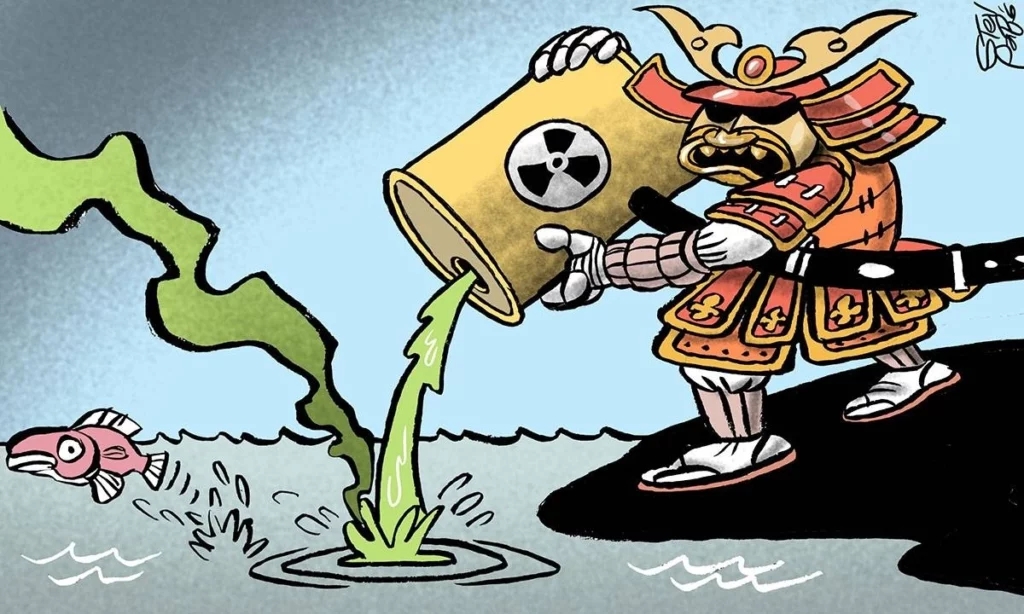
IN the spring or summer of 2021, Japan alarmingly announced that it would release around 1.3 million tons of contaminated water or wastewater from the destroyed Fukushima Daiichi Nuclear Power Plant into the sea. This contaminated water has been accumulating at the Fukushima plant after treatment and dilution. These 1.3 million tons of wastewater can fill up around 500 Olympic-sized swimming pools.
Countries in East Asia, like South Korea and China, immediately protested Japan’s unilateral decision. But it’s not just neighboring countries that have expressed their opposition and resistance to the plan. Even the Japanese people themselves are opposed to it. For instance, the local fisherfolk of Fukushima publicly announced their opposition saying, “… the said plan will undo the years of work rebuilding their industry’s reputation since the plant was destroyed and ruined by the huge tsunami in March 2011.”
Two years later, at a ministerial meeting in January 2023, the Japanese government announced that it was pressing ahead with the release of the 1.3 million tons of radioactive wastewater from the deceased Fukushima into the Pacific Ocean this spring or summer despite widespread opposition from local Japanese fisherfolk, marine scientists, and from countries and civil society organizations across the Asia-Pacific region.
The primary contention of those opposing the dumping of Fukushima nuclear wastewater is that such an act will be hazardous to the marine ecosystem and resources and will affect the fishing industries of countries in East Asia and the wider Asia-Pacific region like the Philippines. If it pushes through, the planned dumping of nuclear wastewater into the Pacific will cause serious damage to the marine ecosystem and resources and adversely impact international public health and safety and the vital interests of the Asia-Pacific region and its people.
No precedent
What is very disquieting is that there is no precedent in the world or actual practice of discharging such a massive volume of nuclear wastewater into the sea, which makes it hard to assess the long-term effects of such planned dumping of radioactive waste into the Pacific Ocean. According to some reports, no independent testing of the nuclear wastewater has been allowed or conducted thus far, which makes the whole venture quite a risky gamble for the Japanese government.
What’s even more bothersome and worrisome is that the International Atomic Energy Agency (IAEA) is not opposed to Japan’s unilateral decision in this regard. The Tokyo Electric Power Co. (Tepco), which owns the power station, claims that the IAEA has given the green light to proceed with the planned discharge of the contaminated water into the sea. Accordingly, last Jan. 20, 2023, in a briefing, IAEA nuclear safety official Gustavo Caruso, who heads a special agency task force on Fukushima, said Japan’s Nuclear Regulation Authority (NRA) has procedures in place to ensure that the discharge meets international safety standards. This is a rather outrageous and dreadful statement from the IAEA, given that it has no concrete study on the possible adverse impact of dumping 1.3 million tons of nuclear wastewater into the sea.
US supports plan
Many marine scientists and opposition groups said that no thorough study has been made with enough details, information and data on the possible undesirable impacts of dumping 1.3 million tons of nuclear wastewater into the sea. A marine biologist at the University of Hawaii Manoa, Robert Richmond, said that this will set a dire and terrible precedent. “There is a strong consensus internationally that continued use of the ocean for dumping waste is simply not sustainable,” Richmond said.
On another note, though unsettling and perplexing, due to geopolitical considerations and geostrategic interests, the United States seems to agree with the unilateral decision of the Japanese government. As expected, Washington is willing to sacrifice the welfare of the wider Asia-Pacific region to prioritize its geopolitical and geostrategic interests in the region in cahoots with the Japanese government by turning a blind eye to the risks and dangers posed by the planned dumping of nuclear wastewater into the Pacific Ocean. Such a phony act on the part of the US colluding with Japan on this issue is indeed morally, ethically, socially, and environmentally retrograde and backward.
Conclusion
No doubt, given the uncertainty of the adverse impacts, risks and safety on the marine environment of not just Japan but of neighboring countries in the Asia-Pacific of the plan to dump 1.3 million tons of nuclear wastewater into the Pacific Ocean, the Japanese government as an act of courtesy should at least conduct comprehensive and sufficient consultations with countries in the Asia- Pacific region to discuss further the issue, possible alternative solutions and its adverse impacts. The unilateral plan of the Japanese government to dump wastewater into the Pacific Ocean needs to be reconsidered and studied further.
Moreover, this unilateral plan of the Japanese government is akin to Japan’s disregard for its adherence and compliance with international law on the protection of the environment, which is a set of principles that aims to curb pollution and depletion of natural resources. The spirit and principles of international environmental law purport that we are one ecosystem, that we are interconnected, and that the polluter must pay.
The bodies of water in Asia are very much connected, and pollutants originating from the Fukushima nuclear wastewater will no doubt reach nearby areas, affecting local marine and coastal environments and people’s health. Thus, if Japan is indeed a responsible member of the community of nations, it should think twice before proceeding with its plan and prudently consult with countries directly affected by such a decision.
However, Japan, a privileged country, may not heed the call of its neighbors, probably because it has the backing of the US. But if something goes wrong with the plan, developing countries like the Philippines will undoubtedly be adversely affected and left alone to suffer the negative consequences.
We all depend on our natural environment. When we destroy our environment, we all suffer. Hence, we should remember that environmental problems and issues, such as the planned discharge of Fukushima wastewater into the ocean, threaten humanity and all species and certainly warrants serious and equal attention. Asia-Pacific countries must speak out and oppose one of the most critical environmental issues that might soon cause marine pollution in the Pacific Ocean and beyond.
Source: The Manila Times
https://www.manilatimes.net/2023/04/20/opinion/columns/should-we-be-wary-of-the-planned-dumping-of-fukushima-wastewater-into-the-pacific/1887838



